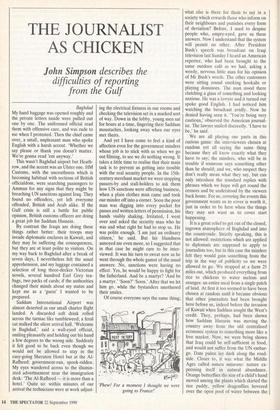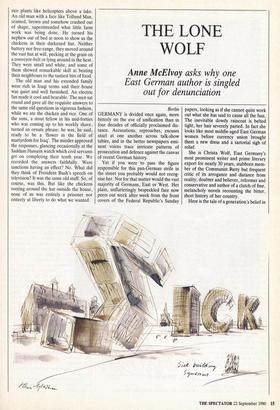THE JOURNALIST AS CHICKEN
difficulties of reporting from the Gulf
Baghdad My hand baggage was opened roughly and the private letters inside were pulled out one by one. The uniformed official read them with offensive care, and was rude to me when I protested. Then the chief came over, a small, unpleasant man who spoke English with a harsh accent. 'Whether we say please or thank you doesn't matter. We're gonna read 'em anyway.'
This wasn't Baghdad airport but Heath- row, and the accent was an Ulster one. HM Customs, with the uncouthness which is becoming habitual with sections of British officialdom, were searching passengers to Amman for any signs that they might be breaching UN sanctions against Iraq. They found no offenders, yet left everyone offended, British and Arab alike. If the Gulf crisis is still a battle for public opinion, British customs officers are doing a great job for Saddam Hussein.
By contrast the Iraqis are doing these things rather better: their troops may invade diplomatic enclaves in Kuwait, and they may be suffering the consequences, but they are at least polite to visitors. On my way back to Baghdad after a break of seven days, I nevertheless felt the usual apprehension, and my luggage contained a selection of long three-decker Victorian novels, several hundred Earl Grey tea- bags, two packs of cards; if the authorities changed their minds about my status and kept me as a 'guest' I wanted to be prepared.
Saddam International Airport was almost deserted as our small charter flight landed. A discarded soft drink rolled across the tarmac like tumbleweed; a feral cat stalked the silent arrival hall. 'Welcome in Baghdad,' said a wall-eyed official, smiling pleasantly and holding out his hand a few degrees to the wrong side. Suddenly it felt good to be back even though we would not be allowed to stay in the easy-going Sheraton Hotel but at the Al- Rafheed: government-run, spook-ridden. My eyes wandered across to the illumin- ated advertisement near the immigration desk: 'The Al-Rafheed — it is more than a hotel.' Quite so: within minutes of our arrival the technicians were at work adjust- ing the electrical fixtures in our rooms and checking the television set in a marked sort of way. Down in the lobby, young men sat for hours at a time, fingering their Saddam moustaches, looking away when our eyes met theirs.
And yet I have come to feel a kind of affection even for the government minders whose job is to stick with us when we go out filming, to see we do nothing wrong. It takes a little time to realise that their main task is to prevent us getting into trouble with the real security people. In the 15th- century merchant market we were stopping passers-by and stall-holders to ask them how UN sanctions were affecting business, when a plain clothes man came and took our minder off into a corner. Soon the poor man was digging into every pocket for passes and written letters of permission, his hands visibly shaking. Irritated, I went over and asked the security man who he was and what right he had to stop us. He was polite enough. 'I am just an ordinary citizen,' he said. But his blandness annoyed me even more, so I suggested that in that case he might care to be inter- viewed. It was his turn to sweat now as he went through the whole gamut of the usual answers: No, sanctions were having no effect. Yes, he would be happy to fight for the fatherland. And be a martyr? 'And be a martyr.' Soon?"Soon.' After that we let him go, while the bystanders smothered their smiles.
Of course everyone says the same thing; 'Phew/ For a moment I thought we were going to France!' what else is there for them to sajr in a society which rewards those who inform on their neighbours and punishes every form of deviation? Before, I used to despise people who, empty-eyed, gave us these answers. Now I understand that the system will permit no other. After President Bush's speech was broadcast on Iraqi television last Sunday I heard an American reporter, who had been brought to the same outdoor café as we had, asking a weedy, nervous little man for his opinion of Mr Bush's words. The other customers were sitting round smoking hookahs or playing dominoes. The man stood there clutching a glass of something and looking anxious. He was a lawyer and it turned out spoke good English. I had noticed him watching the broadcast avidly. Now he denied having seen it. 'You're being very cautious,' observed the American journal- ist. The lawyer smiled discreetly. `I have to be,' he said.
We are all playing our parts in this curious game: the interviewees chosen at random yet all saying the same thing because they all know exactly what they have to say; the minders, who will be in trouble if someone says something other than he should; and we, who suspect they don't really mean what they say, but can only introduce the standard replies with phrases which we hope will get round the censors and be understood by the viewers back home. For us, covering the events this government wants us to cover is worth it, just in order to be here when the things they may not want us to cover start happening.
It is a great relief to get out of the closed, ingrown atmosphere of Baghdad and into the countryside. Strictly speaking, this is not allowed: restrictions which are applied to diplomats are supposed to apply to journalists too, but in this case the minders felt they would gain something from the trip in the way of publicity so we were allowed to go. We stopped at a farm 25 , miles out, which produced everything from rice to chickens to water melons and oranges: an entire meal from a single patch of land. At first it too seemed to have been chosen at random until it became obvious that other journalists had been brought here before us, indeed before the invasion of Kuwait when Saddam sought the West's credit. They, perhaps, had been shown how Saddam Hussein was moving the country away from the old centralised economic system to something more like a free market. Now, we were being shown that Iraq could be self-sufficient in food, and would not suffer from the UN embar- go. Date palms lay dark along the road- side. Closer to, it was what the Middle Ages called natura naturans: nature ex- pressing itself in natural abundance.
Orange butterflies the size of a child's hand moved among the plants which skirted the rice paddy, yellow dragonflies hovered over the open pool of water between the rice plants like helicopters above a lake. An old man with a face like Tollund Man, seamed, brown and somehow crushed out of shape, superintended what little farm work was being done. He turned his nephew out of bed at noon to show us the chickens in their darkened hut. Neither battery nor free-range, they moved around the vast hut at will, pecking at the grain on a conveyor-belt or lying around in the heat. They were small and white, and some of them showed remarkable skill at beating their neighbours to the tastiest bits of food.
The old man and his extended family were rich in Iraqi terms and their house was quiet and well furnished. An electric fan made it cool and bearable. The men sat round and gave all the requisite answers to the same old questions in vigorous fashion, while we ate the chicken and rice. One of the sons, a stout fellow in his mid-forties who was coming up to his weekly shave, turned an ornate phrase: he was, he said, ready to be a 'flower in the field of martyrdom for Iraq'. The minder approved the responses, glancing occasionally at the Saddam Hussein watch which civil servants get on completing their tenth year. We recorded the answers faithfully. Were sanctions having an effect? No. What did they think of President Bush's speech on television? It was the same old stuff. So, of course, was this. But like the chickens rooting around the hut outside the house, none of us was entirely a prisoner nor entirely at liberty to do what we wanted.



































































 Previous page
Previous page